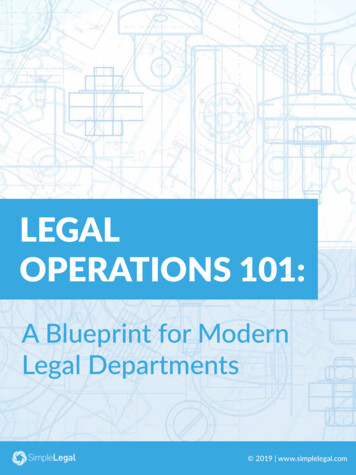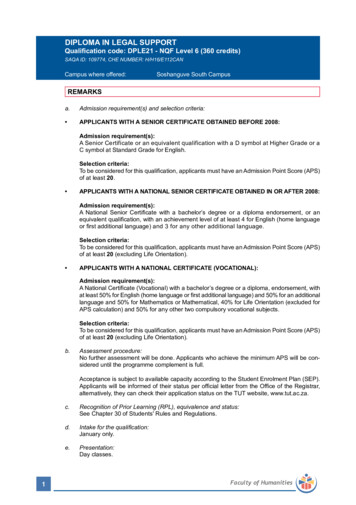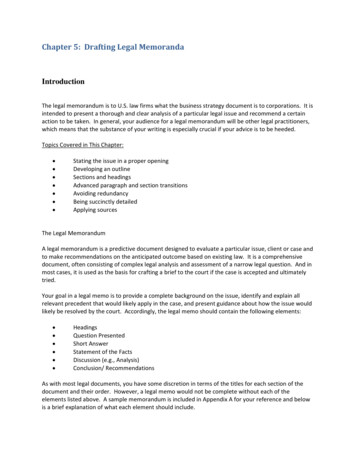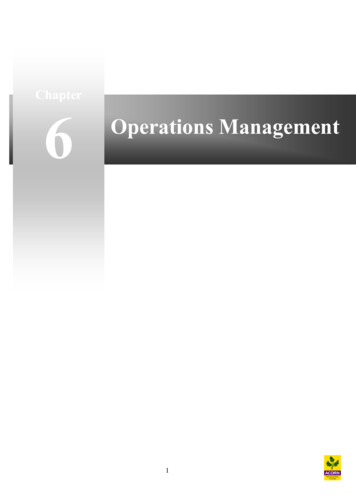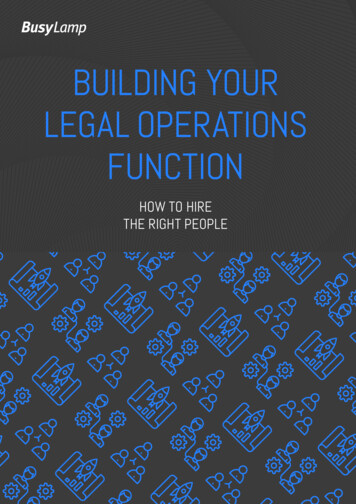
Transcription
1BUILDING YOURLEGAL OPERATIONSFUNCTIONHOW TO HIRETHE RIGHT PEOPLE
2THE HISTORY OF LEGALOPERATIONS, AND WHYYOU NEED ITAs you’re reading this paper you’re probably already aware of what legal operations is, but may be seeking more clarityon what the function should and should not cover in order to address the skills needed and help you create the bestteam. Broadly speaking, legal operations is all the responsibilities of a legal department that aren’t law itself. Spendmanagement, efficiency and productivity, communication, vendor management, technology etc. Perhaps the mostspecific definition on offer is from the Corporate Legal Operations Consortium (CLOC), which umbrellas legal operationsover 12 competencies that every legal function should aspire to have, at three maturity levels. You can find this resourceon their website (https://cloc.org/).Typical skills and responsibilitiesof legal operations.Define and drive initiatives to improve efficiency and process workflows.Manage outside counsel guidelines, legal spend (visibility, control andreduction) and department budget.Optimise law firm performance for maximum value for money.Implement, measure and analyse metrics that inform decision making,turning them into actions that deliver improvements.Implement technology to achieve departmental and business goals.Work cross functionally to demonstrate the legal department’s valuewithin the organisation.Understand and monitor the risks, risk appetite and risk profile of thelegal department within the framework of the organisation.
3Legal operations currently carries so much buzz you’dduring the past decade legal departments in almost allbe forgiven for thinking it’s new, but the function hasjurisdictions, industries and company sizes are findingbeen around longer than you might realise. CLOCthemselves under pressure. Businesses continue to growfor example, was formed in the USA back in 2010.in scope and complexity and the volume and breadth ofBut the buzz is genuine, there is a recent uplift in thelegal expertise required continues to grow too. General1prevalence of the role . If you don’t have the functionCounsel are under more pressure than ever to justifyyet, don’t panic. You are not alone. Although most legaltheir legal costs and improve the efficiency of theirdepartments have some legal operations initiatives,department.a dedicated department is only the norm for just overhalf of the industry. Nevertheless, the trend is headingOne such General Counsel, Joachim Kämpf, ECEtowards dedicated roles. In our recent survey2 of legalProjektmanagement G.m.b.H. & Co. KG (“ECE”) explains,departments worldwide, we found that 44% have legal“We have been dealing with “Legal Operations” tasks foroperations encompassed into someone’s wider remitquite some time, but we have not called it that. Legalrather than a stand-alone role. When asked aboutOperations will bring Legal closer to the day-to-dayexpectations for the next 12 months, this percentagebusiness and thus to the other specialist departments,reduces to 36%, with that 8% difference accountingenabling legal to take on a different, more important rolefor plans to increase legal operations headcount.in the company.” With this demand to make the legalRegardless of the current status, one thing is clear; theredepartment act more “like a business” comes a needare almost no legal departments left that have not yetfor cost control and process improvement. The problemrecognised the importance of legal operations activitieswith this for a traditional legal team is two-fold. One. Theand are already actively involved in this field. It is safe tolegal department’s priority purpose will always be toassume that the 2% of legal departments that currentlygive advice on legal matters. During busy periods, or if ado not focus on legal operations at all will soon changeteam is insufficiently staffed, operations will take a backtheir minds.seat. Two. Achieving operational and business goals3requires skills which are not necessarily part of a lawyer’sSo why the rapid change? In the 1980s and earlier,standard repertoire. This has led to the introduction andcorporate legal departments were almost entirelyrecent, rapid spread of the Legal Operations role.focussed on risk and compliance. The General Counselmanaged external counsel and gave advice to theLet’s look at the benefits legal operations can achieve forbusiness; the legal function was a cost of doing business.the legal department and the organisation as a whole.Over time business has become more complex, moreregulated, and more global. With that, demand forlegal services (and therefore costs) have increased.Eventually, legal no longer had the “get-out clause”of “cost of doing business” and the department wasexpected to manage budgets and efficiencies like otherdepartments already were. At first, this cost sensitivitywas limited to certain industries and company sizes, but1 Chief Legal Officer Survey, Altman Weil, Inc., 20182 BusyLamp Legal Operations Benchmarking Report, BusyLamp GmbH, 20193 BusyLamp Legal Operations Benchmarking Report, BusyLamp GmbH, 2019
4Benefits of legal operationsfor the legal departmentLegal operations helps shape focus areas for the departmentand defines areas for short- and long-term improvement.Introduction of metrics and KPIs allows for measuring andbenchmarking these focus areas.The department has dedicated legal operations resources whoare undistracted by the practice of law so can focus on raisingthe profile of legal and its value to the business.Stronger, data-driven, transparent relationships with externalproviders to maximise value and build more strategicpartnerships with outside counsel and service providers.Standardisation and automation of repetitive oradministrative tasks, such as invoice review, so the team canspend more time on high value work.Consistent use of technology and processes across the team,but also that integrate with systems in the wider business forcompany-wide strategic analytics.Data-driven staffing, matter resourcing and other legalmanagement decisions.When one considers these benefits, the triumph of legalresponsible for these important issues. Although havingoperations is hardly surprising. It is rather surprising thatsome resource is better than none, we advocate fora considerable number of legal departments (44%) dodedicated legal operations personnel to ensure thatnot bundle all these tasks and assign them to (at least)these benefits are realised.one person who can then concentrate fully on and are
5WHO IS BEST FOR THE ROLE?LAWYERS OR NON-LAWYERS?As you’re reading this paper you’re probably in one offrom within the existing legal team when building thetwo camps; either doing no legal operations currently,function. There are many benefits of doing this, butor already doing some legal operations as part ofalso pitfalls, as lawyers often lack the commercial andsomeone’s wider role but figuring out how best tochange management skills to truly succeed in the role.create full time positions. If you’re already doing legalIt’s common to hire someone with a transformation oroperations via an in-house counsel covering some ofcommercial background rather than a legal one, butthese responsibilities, it may make sense to move themmany General Counsel are apprehensive about bringingto a full time Legal Operations role, assuming they area non-lawyer in to manage the department’s operations,ready to take the responsibility for running the legaland there are many good reasons for this wariness. Thedepartment like a business unit. Likewise, if you’retable below outlines in which area of legal operationscurrently not doing any legal operations, you may beeach professional-background-type will be strong andthinking of taking the logical decision of hiring/upskillingweak, though these are Law FirmManagementand PerformanceLegal BackgroundBusiness BackgroundLikely has a well-rounded and broadvisibility of the company’s strengthsand weaknesses, including sensitiveinformation. It is essential that legaloperations understands the entirecompany, not just the legal department.Unless very senior, may not be privyto all information about the company,but are more likely to have worked in across-functional role before, and will beastute in the commercial health of theorganisation and will know to develop thelegal department to contribute to overallbusiness goals.Familiar with typical pressures, prioritiesand changes facing legal departmentsand the industry and will be able to set avision. Can use this knowledge to navigatechallenges and drive successful outcomes.May have no experience of the practiceof law or legal departments and so maystruggle to get support. May lack empathyof the challenges and workload of a legaldepartment and lack important skills likelaw firm management.Experience managing law firmrelationships and negotiations, usuallygetting good quality work.Typically do not benchmark performanceacross firms and have poor visibility ofvalue for money/performance from thecommercial perspective.Experience negotiating with suppliers,including commercially viable rates andinclusion of success metrics into contracts.Law firm relationship management differsfrom typical supplier relationships and theymay lack this experience.
6WHO IS BEST FOR THE ROLE?LAWYERS OR NON-LAWYERS?Legal BackgroundBusiness BackgroundLegalProcurementWill have a value and relationship drivenapproach to procuring legal services thatmay not be cost effective.May take an overly data or cost drivenapproach; getting quality at a good costneeds to be considered.Spendforecasting andbudgetingLimited experience in this area, unlessused to using spend management toolsand strategies.Accurate forecasting and budgeting is avital part of most commercial managers’roles.KPI Measurementand DataAnalysisMay not have exposure as not usuallyrequired of a legal department. Dataanalysis is not usually a skill of a lawyer.Will almost certainly have experiencesetting, measuring, and performing againsttargets and will have some level of dataanalysis ability.A lawyer’s focus is to research and advisethe business, they need to be confident intheir advice and value being thorough overefficiency.Likely a business manager will havealready been tasked with ‘doing morewith less’ at some point in their careerand implemented tools and strategies toachieve this.Legal departments are amongst thosethat are least digitalised and lawyersmay therefore have low tech exposureand experience and may struggle tosuccessfully deliver a technology project.Departments beyond legal have highertechnology maturity and exposure andexperience with different types of softwareand reporting tools. Some may even haveled a technology implemevntation before.ChangeManagementLikely only worked on large projects froma legal perspective but will know how toposition change in a way that communicatesthe change as positive to legal teams.More likely to have been involved in crossfunctional projects and have experiencemanaging the effects of change.RiskManagementWill likely understand and have dealt withrisk as it pertains to matters and the widerorganisation, and the risk profile of legaldecisions and advice.Risk management background is likely to bemore project or IT based but depending onthe background will also understand howexternal factors can effect risk profiles.InnovationLawyers are typically trained to avoid risk,which can be a hindrance to innovation.Business background people can be riskadverse or risk takers, but are less likely tobe risk avoidant than lawyers.EfficiencyTechnologyKnow-How
7THE BEST OF BOTH WORLDS?“ROBUST OPERATIONS TEAMS NEED TO HAVE A VARIETY OF EXPERIENCES;IT’S ESSENTIAL TO RECRUIT TEAM MEMBERS WHO HAVE OTHER SKILLS AND CAN CHALLENGETHE WAY WE HAVE TYPICALLY WORKED AS A LEGAL FUNCTION IN THE PAST TO IMPROVE OUREFFICIENCY AND PERFORMANCE”– AMY MCCONNELL, HEAD OF LEGAL OPERATIONS, VODAFONE BUSINESSAs you can see above, there is no clear winner. Thoseour approach.” The same is true of Ben Eason’s teamwith a business background are more likely to have theat Barclays, “it’s vital that teams are a blend of change,experience to maximise efficiency, manage budgets,cost and commercial backgrounds mixed with thoseimplement technology and drive overall businesswith a legal background. When hiring, we look at whereresults during change. In contrast, only the lawyers willthe gaps in skillsets are in order to maintain the balanceunderstand the intricacies of the law, managing externalof both sets of experiences”. To summarise, your legalcounsel, and how goals can’t be solved by applying text-operations team should be made up of commerciallybook theory. It’s also important to think beyond technicalastute people with experience managing projects andskills. Ben Eason, Head of Legal Transformation ata working knowledge of how an in-house legal functionBarclays says, “evidence of flexibility, interchangeability,operates. Finding a single person with all these qualitiesnegotiation and managing stakeholders are crucial.is rare, but fortunately your legal operations managerThese skills are arguably the most important for legaldoesn’t need to tick all the boxes if the collective teamoperations success and can come from any background”.does. Remember, the most advanced legal operationsAmy McConnell, Head of Legal Operations at Vodafoneteams all advocate having a diverse team of differentBusiness agrees, “fundamental skills I look for are anbackgrounds and skills. Rather than finding a soloability to work as a team, self-motivation, a passion forunicorn, a mixed team should be your vision.driving change and fixing problems, a growth mindset,However, a whole team of legal operations professionalsand a love of learning”.may be a distant dream for your organisation right now.Legal operations is multi-faceted with many roles andSo if you can only have one, who wins? The lawyer or theresponsibilities. In order to generate the best outcome“business-person”? Amy McConnell, Vodafone, says itfrom your legal operations initiatives, it’s vital to havedepends on support for the role; “if there is no resourcea diverse team of individuals with strengths in thesefrom other members of the team, then having a lawyerspecific areas. In fact, this can make your team morelead would initially be better. They would have a muchinnovative and generate higher company revenue .better understanding of problems and how the teamAmy McConnell, Vodafone Business says, “I stronglyoperates and can create the vision for legal. However,believe that to create the best team, you need diversityif the full-time person is supported by another memberof skills, experience, perspective and personality types.of the legal team whose job it is to create the visionI have a legal background, so I specifically looked forand strategy, then I would propose a transformation orteam members who thought very differently to me andoperations specialist.” Iain MacDonald, Legal Operationsother members of the legal team, to have new ideas,Consultant formerly at Lloyds Banking Group concurs, “Idiversity of thought and to challenge each other onhave seen really good “non-lawyers” who could run legal44 How diverse leadership teams boost innovation, Boston Consulting Group, 2018
8operations, but they have all benefited from working withinGeneral Counsel, Joachim Kämpf explains, “Due to thethe legal function. I believe it can work if the “non-lawyer”modest size and the alignment of our legal department,has access to the lawyers. They will need to develop goodwe do not have a permanent “Legal Operations” teamrelationships with colleagues in the legal function and bethat deals exclusively with the issues. We have identifiedunafraid to ask what, why, when but also how”.a legal counsel who, due to his technical affinity andIn any case, don’t get bogged down with team namegood networking in the company, leads and steers “Legaldefinitions. Stripping away the label of legal operations,Operations” as a special task and the individual issuesBen Eason looks at this scenario pragmatically; “Even inare distributed among several colleagues who have alsodepartments with no dedicated legal operations resource,assumed these as special tasks. The selection was basedthe work still needs to happen. It may be overseen by theon motivation and professional aptitude.”General Counsel, but the team still needs access to changemanagement, data analysis, technology, and commercialIf you are only in the position to hire one legal operationsskills.” The ECE legal department is one such example.resource right now, you could try the following options:Ensure the legal operations head has the change and commercial skills to set thevision and manage legal operations strategically, and that the other skills are presentelsewhere in the legal team or wider business.Similarly to the above, you can fill skill gaps by using a legal operations consultancy,but this is expensive. Both Barclays and Vodafone have used consultants for shortterm needs or filling skill gaps, but prefer to build the function internally.Upskill a business-person to be a lawyer, or a lawyer to be a business-person. As thelatter does not require years of education, it is the much easier option, as long as youcan find a lawyer able and willing to diversify into a more commercial role.Training your lawyers to be more commercially minded“IT’S MUCH EASIER TO GET LAWYERS INTERESTED IN LEGAL OPERATIONS THAN IT WAS 5-10YEARS AGO. THEY ARE INCREDIBLY IMPORTANT IN LEGAL TRANSFORMATION AS THEY AREEXTREMELY INTELLIGENT, WILLING TO LEARN, AND WANT TO DO THE RIGHT THING.”– BEN EASON, LEGAL TRANSFORMATION, BARCLAYS”As you’re reading this paper you’re probably in one of two camps; either doing no legal operations currently, or alreadydoing some legal operations as part of someone’s wider role but figuring out how best to create full time positions. Ifyou’re already doing legal operations via an in-house counsel covering some of these responsibilities, it may make senseto move them to a full time Legal Operations role, assuming they are ready to take the responsibility for running thelegal department like a business unit. Likewise, if you’re currently not doing any legal operations, you may be thinkingof taking the logical decision of hiring/upskilling from within the existing legal team when building the function. There
9are many benefits of doing this, but also pitfalls, as lawyers often lack the commercial and change management skillsto truly succeed in the role. It’s common to hire someone with a transformation or commercial background rather thana legal one, but many General Counsel are apprehensive about bringing a non-lawyer in to manage the department’soperations, and there are many good reasons for this wariness. The table below outlines in which area of legal operationseach professional-background-type will be strong and weak, though these are generalisations.Job sharing/Job Swaps.department’s can help to train. This is a technique used inThese can be done as sabbaticals, smaller 2-3 monthBarclays, says Ben Eason, “We use upskilling initiatives tolong placements, or even one day a week alongside theeducate lawyers on subjects such as data analysis, cloud,day job. If you already have a legal operations team, thencyber security, AI and commercials - and the businessplacing lawyers on secondment here is the obvious choice.background professionals about the practice of law andAlso consider placements with finance, sales, marketing,the legal market. It’s important for us that the wholeoperations, product management, data analysis – anyteam gets to know the people, departments and systemsarea of the business that will broaden their skillset in a waythroughout the whole company so they can provide thethat addresses one of the functions of legal operations.most value.”The challenge will be finding colleagues from these otherdepartments that are qualified enough to do a genuineImplement and use technology‘job swap’ into legal. Shadowing is a good alternativeDon’t wait for your Legal Operations Director to be in place;in these scenarios. Iain MacDonald, Legal Operationsstart using technology today. Empower your team to thinkConsultant formerly at Lloyds Banking Group urges leadersabout what slows them down at work on a daily basis andto upskill the non-lawyers in the legal operations team too,investigate if technology could solve these challenges.“Providing the “non lawyers” with opportunities to shadowEncourage them to research and recommend softwarelawyers will allow them to better understand the differenttools that could help them and the wider team. A team thatroles, responsibilities and challenges facing the lawyerssees the value in technology will make it easier when theand hopefully build stronger working relationships withintime comes to roll out more sophisticated solutions.the function.” Larger organisations may already have jobswap initiatives in place so check with your HR department.Regular presentations and open Q&A about companyrevenue, profits and goalsNon-legal cross-functional project participationIf your company does regular ‘town halls’ where theyIf leading a project is too much of a step, participating inpresent financial updates and mission statements,any cross-functional project, even fun ones like the socialencourage your team to attend these. Start doing themcommittee, will build useful skills.for just your team if they don’t exist company-wide. Doa legal team de-brief on how these numbers impact theTraining Courses, Conferences, Newslettersteam and how the team can help. Encourage Q&A, evenThe most obvious way to build the skills you need in yourprivately if needed, and build an ethos that there’s no suchteam is through training courses, but conferences canthing as a stupid question. Get your team interested andalso impart knowledge and inspire. Join membershipeducated in the financial health of the organisation andorganisations like CLOC and encourage your team tohow legal can contribute. Your legal operations team willsubscribe to industry news and blogs. Training doesn’tneed to be fluent in financial terminology and confidenthave to be an external cost as a lot of the skills will existwith budgeting and reporting.in the company already and colleagues from other
10THE ROLE OF TECHNOLOGY INLEGAL OPERATIONS SUCCESS“THERE WAS, AND CONTINUES TO BE, SO MUCH CHANGE IN THE LEGAL MARKET.IT’S REALLY EXCITING, THERE IS SO MUCH THAT CAN BE DONE AND ACHIEVED WITHDIGITALISATION AND INNOVATION”– BEN EASON, LEGAL TRANSFORMATION, BARCLAYS”This paper is focussed on choosing the right people for theoperations discipline is no exception to this is alreadyrole of Legal Operations, but it’s no secret that the rightproven by a glance at the world’s leading legal operationspeople need to be equipped with the right technology. Inteams. There is not one among them who does not relytoday’s world, goals such as transparency, efficiency gainson tailor-made legal operations tools in their daily work.and data analysis are achieved through the combinationA whole paper could be written on this subject alone, butof skilled personnel and software. The fact that the legalhere are some examples of how technology helps:Creating workflows for repetitive tasks automates manualprocesses and improves productivity.Real time dashboards on matter or contract statuses give visibilityto stakeholders.Legal e-Billing ensures law firms adhere to billing guidelines whichsaves money.Law firm price and performance can be compared for moretransparent and fair reviews and negotiations.Knowledge management tools make it easier to collaborate,search and find information and documents.Consistent data creates reports and analytical capabilities toenable decision making.In the BusyLamp Legal Operations Benchmarking Report5, we found a high correlation between legal operations maturityand breadth of legal technology being used. Whether slicing the results to compare by country, industry, or companysize, the result is the same; mature legal operations and legal technology usage are correlated. Using technology toassist in achieving goals means greater success, which leads to growing legal operations departments and moreadvanced capabilities and goals. The rise of legal operations goes hand in hand with the market trend of increasing legal5 BusyLamp Legal Operations Benchmarking Report, BusyLamp GmbH, 2019
11technology budgets. Mature departments create technology roadmaps and business cases, which are more likely tosecure investment than less strategic requests6. Iain MacDonald advises, “I think the more mature legal functions do nowrecognise the value of providing meaningful data to support a business case to invest in new technology. Unfortunately,IT budgets can quickly be drained from managing legacy systems (that require company-wide patches for example),so make sure you consider the group-wide implications of integrations and on-going running costs.” Finally, a warning:legal as a department is typically behind the curve when it comes to digitalisation, and although the benefits of legaltechnology are obvious, adoption and change management issues can slow down your route to success. JoachimKämpf, General Counsel, ECE has experience of this, “For any technical solution, it is important that it is easy to useand that it integrates well into the existing IT landscape. When implementing solutions, every case will have changeprocesses that individual employees handle differently; the employee impact must not be ignored”. We have addressedthis topic together with KPMG Law, Liquid Legal Institute and leading General Counsel and Legal Operations Managersin the “In-House Legal Digitalisation Guide”. With regards to the initial question of what skills a legal operations leadershould have, it is vital that you consider their experience with rolling out and successfully using technology to achievebusiness goals, as this will form a large part of the role.IN CONCLUSION“BE CURIOUS ABOUT EVERYTHING, AND TAKE EVERY OPPORTUNITY TO LEARN SOMETHING NEW,INCLUDING BY BRINGING IN NEW TEAM MEMBERS WHO HAVE HAD COMPLETELY DIFFERENTEXPERIENCES, SKILLS AND APPROACHES TO YOU”– AMY MCCONNELL, HEAD OF LEGAL OPERATIONS, VODAFONE BUSINESSWith global business continuing to grow in scope andgaps. If you can only have one person, hire someone withcomplexity, the demand for legal services will continueexperience, or upskill one of your lawyers who wants toto rise. Legal departments will remain under pressuremake the career change to a more commercial role. Theto advise the business and procure legal services inlatter should be done on an ongoing basis anyway in orderthe most efficient and cost-effective way, withoutto future proof your department. As the legal departmentcompromising on quality. To do so effectively requireshas to continually demonstrate its value to the businessstandardisation of processes, excellent legal counsel,and be seen as an independent business unit, don’tautomation or outsourcing of low-value tasks, outsideonly concentrate on those with desires to broaden theircounsel management, cost control, and analysis of datacareers. Spend time and energy to make your entire teamto make strategic improvements. This all falls under themore commercially astute which will help the lawyers andremit of legal operations, a function that will soon be anon-lawyers work more effectively together, strengthennecessity for all, and already is for many. Many of theseyour team in the eyes of the wider business and lead bothroles require skills not held by your typical corporatethem and the company as a whole to greater success. Lastlawyer, and commercial and transformation skills arebut not least: Make sure that your legal operations teama necessity. Yet legal department management hasis not only well staffed, but also optimally technologicallynuances that require an understanding not held by allequipped. If you manage to do this, nothing will stand inbusiness people. The “best of both worlds” solution isthe way of the success of your legal department as thea team with diverse backgrounds, made of up existingcentral unit of the overall organisation.colleagues and external hires that fill important skill6 CLOC 2019 State of the Industry, Corporate Legal Operations Consortium, 2019
12OUR TEAM: DIVERSE, DYNAMIC,CUSTOMER SUCCESS-DRIVENAND TRUSTEDFounded by a team of lawyers and powered by manysimplifying and improving their legal operations. Today’sfrustrated users of endless spreadsheets and clunkylegal departments leverage our end-to-end solution tolegacy eBilling and matter management systems,drive efficiencies from pitch to completion. Become aBusyLamp is the leading SaaS alternative for efficientmember of the BusyLamp user family and take advantageenterprise legal management. We help legal departmentsof our sophisticated sourcing, fee tracking, mattersave time, significantly reduce overhead and collaboratemanagement, eBilling as well as analytics & reportingmore effectively with inside and outside counsel byfeatures.OUR OFFICESFRANKFURT, GERMANYFriedensstraße 11, 5th Floor60311 Frankfurt am MainLONDON, UK2 Riding House StreetW1W 7FA LondonNEW YORK CITY, USA80 Pine Street, Floor 24New York, NY 10005Follow us on Twitterwww.busylamp.com info@busylamp.com info@busylamp.comFind us on LinkedInFollow us on TwitterFind us on LinkedIn
team. Broadly speaking, legal operations is all the responsibilities of a legal department that aren't law itself. Spend management, efficiency and productivity, communication, vendor management, technology etc. Perhaps the most specific definition on offer is from the Corporate Legal Operations Consortium (CLOC), which umbrellas legal operations
